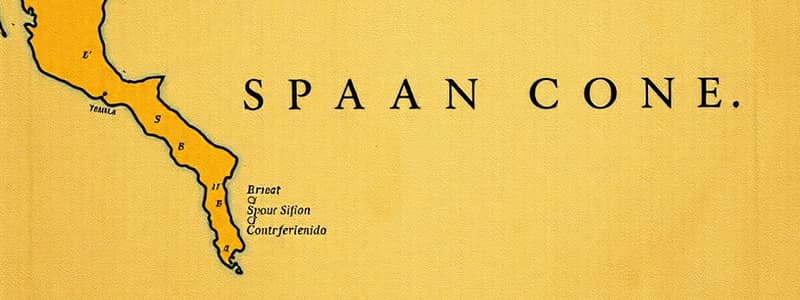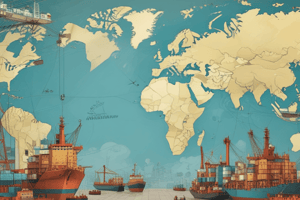Podcast
Questions and Answers
What was one of the primary motivations for Southern Cone governments to encourage immigration in the early 20th century?
What was one of the primary motivations for Southern Cone governments to encourage immigration in the early 20th century?
- To enhance their military capacity
- To promote a larger population of English and German citizens (correct)
- To develop a more diverse cultural identity
- To increase trade with neighboring countries
Who was a notable military dictator in Argentina, known for totalitarian practices?
Who was a notable military dictator in Argentina, known for totalitarian practices?
- José Uriburu
- Augusto Pinochet
- Juan Perón (correct)
- Salvador Allende
What was the general attitude of the USA towards Southern Cone governments during the Cold War?
What was the general attitude of the USA towards Southern Cone governments during the Cold War?
- A commitment to non-intervention
- Encouragement of communist ideologies
- Promotion of military dictatorships (correct)
- Support for socialist movements
What percentage of the Southern Cone population identifies as mestizo?
What percentage of the Southern Cone population identifies as mestizo?
What is mate traditionally consumed from?
What is mate traditionally consumed from?
Which of the following best describes the cultural identity of the Southern Cone?
Which of the following best describes the cultural identity of the Southern Cone?
Which leader's military coup led to the rise of Augusto Pinochet in Chile?
Which leader's military coup led to the rise of Augusto Pinochet in Chile?
Which countries are included in the Southern Cone region?
Which countries are included in the Southern Cone region?
What major cultural influence existed in the Southern Cone prior to European arrival?
What major cultural influence existed in the Southern Cone prior to European arrival?
What symbol of national identity emerged in Argentina during the colonial period?
What symbol of national identity emerged in Argentina during the colonial period?
When did the Southern Cone countries begin to gain independence?
When did the Southern Cone countries begin to gain independence?
What characterized the Southern Cone's geography?
What characterized the Southern Cone's geography?
What was the main agriculture-driven attraction for the Spanish in the Southern Cone?
What was the main agriculture-driven attraction for the Spanish in the Southern Cone?
What myth attracted tourists to Patagonia?
What myth attracted tourists to Patagonia?
What was a significant change occurring in the Southern Cone during the mid to late 19th century?
What was a significant change occurring in the Southern Cone during the mid to late 19th century?
Flashcards
Southern Cone location
Southern Cone location
The Southern Cone is a region in South America, encompassing Argentina, Chile, Uruguay, Paraguay, and parts of southern Brazil, located below the Tropic of Capricorn.
European arrival impact
European arrival impact
European arrival, especially Spanish, led to the establishment of major cities in the Southern Cone, driven largely by the region's agricultural potential.
Gauchos Origins
Gauchos Origins
Gauchos, a distinct cowboy culture, emerged in the Southern Cone during the late colonial period.
Southern Cone Independence
Southern Cone Independence
Signup and view all the flashcards
Southern Cone cultures
Southern Cone cultures
Signup and view all the flashcards
Magellan's impact
Magellan's impact
Signup and view all the flashcards
Spanish Colonial focus
Spanish Colonial focus
Signup and view all the flashcards
Immigration to Southern Cone
Immigration to Southern Cone
Signup and view all the flashcards
Southern Cone Immigration
Southern Cone Immigration
Signup and view all the flashcards
Southern Cone Dictatorships
Southern Cone Dictatorships
Signup and view all the flashcards
Role of the USA in the region
Role of the USA in the region
Signup and view all the flashcards
Southern Cone Identity
Southern Cone Identity
Signup and view all the flashcards
Mate Drink
Mate Drink
Signup and view all the flashcards
Argentine Identity
Argentine Identity
Signup and view all the flashcards
Economic Stability in Southern Cone
Economic Stability in Southern Cone
Signup and view all the flashcards
Study Notes
Southern Cone Overview
- Magellan's voyage proved South America's southern tip in 1520, defining the Southern Cone region.
- The Southern Cone comprises Argentina, Chile, Uruguay, Paraguay, and parts of southern Brazil.
- Its geography ranges from Andean peaks to the vast plains of the Chaco and Pampas.
- The region has a temperate climate, but also extreme conditions in certain areas.
Pre-European History
- Prior to European arrival, the Southern Cone was inhabited by numerous Amerindian nations.
- Major cultures included the Tupi, Guaraní, Tehuelche, and Mapuche.
- The Inca Empire expanded and conquered many Andean cultures in the 15th century.
Spanish Colonialism
- Spanish colonialism focused on the Southern Cone after the Inca Empire's defeat and Peru's colonization.
- The area's vast agricultural land was a key draw for colonization.
- The gaucho, a type of cowboy, emerged towards the end of the colonial period and later became a symbol of Argentina.
Southern Cone Independence
- The Southern Cone achieved independence from Spain in the early 19th century.
- The region became a focal point for immigration, particularly Southern and Eastern Europeans.
- Italy's influence is still apparent in the area.
- Many people were drawn to the region due to the scenery and mythology surrounding Patagonia.
- The region saw significant immigration, encouraged by governments in the belief that increased European populations would benefit their nations.
Southern Cone Political Issues of the 20th Century
- The 20th century saw military dictatorships and strong political figures.
- Argentina saw dictatorships starting with José Uriburu in 1930, followed by Juan Perón's populist rule.
- A subsequent military coup in Argentina resulted in thousands of deaths.
- Chile suffered under the Augusto Pinochet dictatorship (1973–1990) and similar violence.
- Cold War-era US involvement focused on preventing the spread of communism in the region.
- CIA involvement helped Pinochet rise to power, aiding the rebellion against Salvador Allende.
Southern Cone Society and Culture Today
- Southern Cone identity is largely European, with significantly less Amerindian or mixed ancestry than other parts of Latin America.
- Mate, a tea-like drink, is a central element of the culture.
- The region shows strong European heritage.
- Consumption of mate is socially important; refusing a gourd and straw offer is considered rude.
Studying That Suits You
Use AI to generate personalized quizzes and flashcards to suit your learning preferences.




